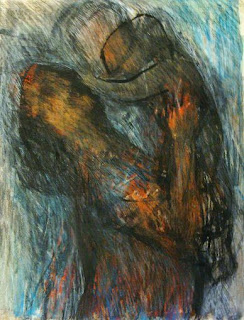SHE
I added
poison in her cup after going through a series of dilemmas
“Is it
ready?, do you need any help ?” she shouted from the hall
I rushed
back to the hall, and there she was, sitting on the couch, patiently waiting
for me. My face glistened with sweat as I leaned in, offering her the cup.
Unexpectedly, she gently took the entire tray from my hand and placed it on the
table. With a tender gesture, she dabbed my sweat with her saree's pallu, just
as she used to do during my childhood when I returned home from school in the
sweltering summers. A warm smile graced her face, and we both settled onto
separate couches.
"Why
are you sweating? Is the air conditioning not functioning?" she inquired.
Throughout
her life, she had never been fond of air conditioning. In my childhood, during
the summers, she would take us siblings to the taps, and every night before
bed, we would bathe under their cooling flow. I know "shower" isn't
the most accurate term for this method, but I can take that small liberty. In
the afternoons, when I hurriedly delivered her husband's lunchbox to his
office, she would always place half a sliced onion in each of my pockets, as a
protective measure against the scorching heatwaves. Despite her husband's
financial capability to afford a widow AC, she never felt inclined to request
an air conditioner.
"I
already had two cups of coffee before you arrived, that's why," I muttered
as I hastily removed traces of a crime.
"Oh,
come on. You can enjoy an extra cup of coffee with me," she insisted.
What could
I say? Whenever she asked me for something twice, I found myself unable to
refuse. Not saying NO to her was, in
essence, accepting her request. This was a lesson I had learned over our 20
years living with her. Perhaps that's why she never understood the concept of
consent. She was never willing with my father, and I would hear her murmuring
her discontent when he asked her to lie with him. Yet, she remained silent,
giving my father a false sense of acceptance rather than rejection.
I don't
think she liked her coffee, but then again, who would enjoy drinking poison?
Her expression was truly dreadful. It mirrored the same expression I had when
she would pack the same lunch for me every day during my school years—a paratha
and achaar. My schoolmates even started calling me 'kaaccha limbu' because of
it. However, for her husband, she would prepare different meals every day, some
day paneer, some day paneer and some day paneer. In a middle-class Brahmin
family, paneer was seen as a symbol of elitism. Her husband never sought
consent for anything. He made me choose science over humanities, made me wear a
janeu, turned his wife into a sex slave, and even passed away without
consulting us. I mean, where is the consent
in all of that? Shouldn't one ask before departing? Don't you think so?
"He
loved you so much," she said.
"Me
to, but could’t say this to him now," i said, smiling inside
"Don’t worry, i’ll let him now” she said
"Why?
Why would you say that?" I questioned.
"I
don't know, just thought life is so uncertain."
I
understand that life is uncertain, but why does uncertainty come into play when
we discuss ending it? Why not talk about the uncertainty of living? I wish she
had discussed uncertainty with with me. I hoped she would have told me that
nothing is permanent, not even the gods—they also change. She was my god from
the moment I took my first breath, but as I said, nothing is certain, life is
uncertain. Her existence has become satanic to me now. I hope she finds
happiness wherever she may go, an hour from now.
"Well
then, I should take my leave. You must have some work to attend " she
said, rising from the couch.
An expression of disgust is still lingered on her face, so I asked
"You don't drink black coffee, right?" I inquired.
"No,"
she replied.
"Then
why did you drink it today?" I questioned.
“Because
poison mixes well in hot water”
SHE SAID.



Comments
Post a Comment